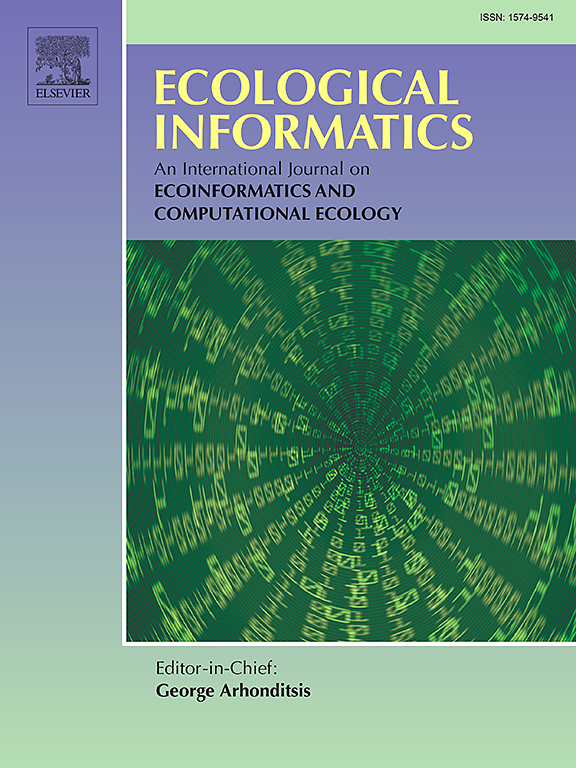Metric learning unveiling disparities: A novel approach to recognize false trigger images in wildlife monitoring
IF 5.8
2区 环境科学与生态学
Q1 ECOLOGY
引用次数: 0
Abstract
Wildlife monitoring using camera traps is a vital tool for ecosystem health assessment. However, camera traps often face high rates of false-triggered images (empty shots), significantly impacting data processing efficiency. This study proposes a metric learning-based method for false-triggered image recognition. By integrating K-means clustering for sample selection and a triplet loss function for model optimization, the approach effectively distinguishes subtle feature differences in false-triggered images. Experiments demonstrate that the proposed method achieves 80.17% Accuracy, 79.79% Recall, and a reduced false positive rate (FPR) of 19.48% on test datasets collected from various regions. Compared to traditional models, it improves Accuracy and Recall by 5.5% and 5.96%, respectively, while reducing the FPR by 5%. On embedded device Jetson Nano, the method achieves a single-image inference time of just 0.076 s, showcasing its potential for deployment in resource-constrained environments. This research addresses challenges related to high intra-class diversity and inter-class similarity in false-triggered images, offering a novel solution to enhance wildlife monitoring efficiency. The code is available at https://github.com/hzl-bjfu/AIPL/tree/master/RFTI.
度量学习揭示差异:在野生动物监测中识别假触发图像的新方法
利用相机陷阱监测野生动物是生态系统健康评估的重要工具。然而,相机陷阱经常面临高频率的假触发图像(空拍摄),严重影响数据处理效率。本研究提出一种基于度量学习的伪触发图像识别方法。通过K-means聚类进行样本选择和三重损失函数进行模型优化,该方法可以有效地区分假触发图像中的细微特征差异。实验表明,该方法在不同地区的测试数据集上准确率达到80.17%,召回率达到79.79%,误报率(FPR)降低了19.48%。与传统模型相比,准确率和召回率分别提高了5.5%和5.96%,FPR降低了5%。在嵌入式设备Jetson Nano上,该方法实现了单图像推理时间仅为0.076秒,显示了其在资源受限环境下部署的潜力。该研究解决了假触发图像中高类内多样性和类间相似性的挑战,为提高野生动物监测效率提供了一种新的解决方案。代码可在https://github.com/hzl-bjfu/AIPL/tree/master/RFTI上获得。
本文章由计算机程序翻译,如有差异,请以英文原文为准。
求助全文
约1分钟内获得全文
求助全文
来源期刊

Ecological Informatics
环境科学-生态学
CiteScore
8.30
自引率
11.80%
发文量
346
审稿时长
46 days
期刊介绍:
The journal Ecological Informatics is devoted to the publication of high quality, peer-reviewed articles on all aspects of computational ecology, data science and biogeography. The scope of the journal takes into account the data-intensive nature of ecology, the growing capacity of information technology to access, harness and leverage complex data as well as the critical need for informing sustainable management in view of global environmental and climate change.
The nature of the journal is interdisciplinary at the crossover between ecology and informatics. It focuses on novel concepts and techniques for image- and genome-based monitoring and interpretation, sensor- and multimedia-based data acquisition, internet-based data archiving and sharing, data assimilation, modelling and prediction of ecological data.
 求助内容:
求助内容: 应助结果提醒方式:
应助结果提醒方式:


